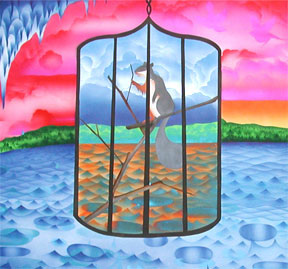I looked up a fable from Aesop that I hadn't heard of when I found this image online at the NYPL.

The image is an illustration of the fable of the eagle and the dung beetle, and the manuscript that I was looking at online has been
translated by one Laura Gibbs, from whom comes this explanation of the image:
As he was being chased by an eagle, the hare ran to the dung beetle, begging the beetle to save him. The beetle implored the eagle to respect the hare's asylum, solemnly compelling him by the sacred name of Zeus and pleading with the eagle not to disregard him simply because of his small size. But the eagle brushed the beetle aside with a flick of his wing and grabbed the hare, tearing him to pieces and devouring him. The beetle was enraged and flew off together with the eagle to find the nest in which the eagle kept his eggs. After the eagle was gone, the beetle smashed all the eggs. When the eagle came back, he was dreadfully upset and looked for the creature who had smashed the eggs, intending to tear him to pieces. When it was time for the eagle to nest again, he put his eggs in an even higher place, but the beetle flew all the way up to the nest, smashed the eggs, and went away. The eagle grieved for his little ones and said that this must be the result of some angry plot of Zeus to exterminate the eagle race. When the next season came, the eagle did not feel secure keeping the eggs in his nest and instead went up to Olympus and placed the eggs in Zeus's lap. The eagle said to Zeus, 'Twice my eggs have been destroyed; this time, I am leaving them here under your protection.' When the beetle found out what the eagle had done, he stuffed himself with dung and went straight up to Zeus and flew right into his face. At the sight of this filthy creature, Zeus was startled and leaped to his feet, forgetting that he held the eagle's eggs inside his lap. As a result, the eggs were broken once again. Zeus then learned of the wrong that had been done to the beetle, and when the eagle returned, Zeus said to him, 'It is only right that you have lost your little ones, since you mistreated the beetle!' The beetle said, 'The eagle treated me badly, but he also acted very impiously towards you, O Zeus! The eagle did not fear to violate your sacred name, and he killed the one who had taken refuge with me. I will not cease until I have punished the eagle completely!' Zeus did not want the race of eagles to be wiped out, so he urged the beetle to relent. When his efforts to persuade the beetle failed, Zeus changed the breeding season of the eagles, so that it would take place at a time when the beetles were not found above ground.
(Note from Laura Gibbs: The fable of the dung beetle and the eagle is alluded to on three occasions by Aristophanes: Wasps 1448, Lysistrata 695 and Peace 127-34. In Caxton (6.2), the dung beetle is replaced by a weasel!)
Source: Aesop's Fables. A new translation by Laura Gibbs. Oxford University Press (World's Classics): Oxford, 2002.
You can read more fabulous translations of fables and buy the book
here and you can see more images from the book
here.
